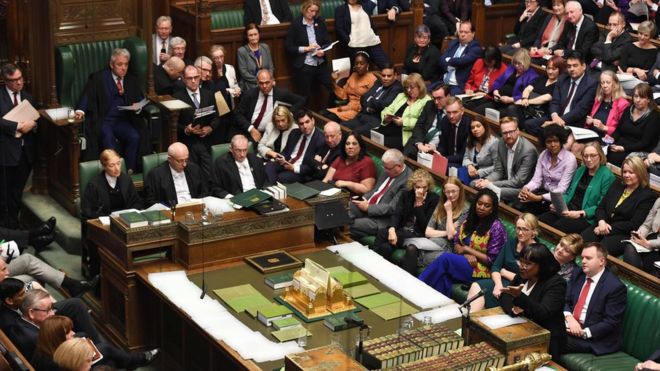
Special sitting for MPs to decide Brexit future
- MPs will be called to Parliament for a special Saturday sitting in a decisive day for the future of Brexit.
MPs will be called to Parliament for a special Saturday sitting in a decisive day for the future of Brexit.
Parliament will meet on 19 October after a crunch EU summit – seen as the last chance for the UK and EU to agree a deal ahead of 31 October deadline.
If a deal is agreed, Boris Johnson will ask MPs to approve it – but if not, a range of options could be presented.
The BBC’s Laura Kuenssberg says these could include leaving without a deal, and halting Brexit altogether.
The prime minister has said he is determined the UK leaves the EU on 31 October, despite legislation passed by MPs last month, known as the Benn Act, which requires Mr Johnson to write to the EU requesting a further delay if a deal is not signed off by Parliament by 19 October – or unless MPs agree to a no-deal Brexit.
No 10 has insisted Mr Johnson will comply with the law, but Laura Kuenssberg says there are still conversations going on in Downing Street about writing a second letter, making the case that a delay is unnecessary.
The House of Commons has only sat on four Saturdays since 1939, including on 2 September that year, due to the outbreak of World War Two.
The last time there was a Saturday sitting was 3 April 1982, due to the invasion of the Falkland Islands.
Talks are ongoing between the UK and EU’s negotiating teams ahead of the summit on 17 and 18 October, but the political tensions have been ramped up in recent days.
Mr Johnson submitted new proposals to the EU last week for a Brexit deal, centred on replacing the Irish backstop – the policy negotiated between Theresa May and the EU to prevent a hard border returning to the island of Ireland.
French President Emanuel Macron had said the EU would make its position clear on the plans by the end of this week.
But a row broke out on Tuesday after a No 10 source said a call between Mr Johnson and the German chancellor, Angela Merkel, had made a deal “essentially impossible”, claiming she made clear a deal based on his proposals was “overwhelmingly unlikely”.
Mrs Merkel’s office said it would not comment on “private” conversations.
But the President of the European Council Donald Tusk sent a public tweet to Mr Johnson, accusing him of playing a “stupid blame game” – a criticism echoed by a number of opposition parties in the UK.
On Tuesday night, Irish Taoiseach (Prime Minister) Leo Varadkar spoke to Mr Johnson on the phone for 45 minutes, and told broadcaster RTE it would be “very difficult” to reach an agreement before the end of the month.
However, the two leaders are expected to meet for further Brexit talks later this week.



